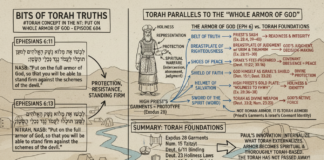In this week’s Torah portion, comparison of the English translation (NASB) to the Masoretic Text (Ginsburg’s) reveals a discrepancy between the numbering system that is used. In the English translation, the Torah portion begins in Parashat Vayikra as compared to the Masoretic Text saying, וידבר יהוה אל־משה לאמר 5:19 The LORD spoke to Moses, saying: נפש כי תחטא ומעלה מעל ביהוה וכחש בעמיתו בפקדון או־בתשומת יד או בגזל או עשק את־עמיתו 5:20 When a person sins and commits a trespass against the LORD by dealing deceitfully with his fellow in the matter of a deposit or a pledge, or through robbery, or by defrauding his fellow, או־מצא אבדה וכחש בה ונשבע על־שקר על־אחת מכל אשר־יעשה האדם לחטא בהנה 5:21 or by finding something lost and lying about it; if he swears falsely regarding any one of the various things that one may do and sin thereby— והיה כי־יחטא ואשם והשיב את־הגזלה אשר גזל או את־העשק אשר עשק או את־הפקדון אשר הפקד אתו או את־האבדה אשר מצא 5:22 when one has thus sinned and, realizing his guilt, would restore that which he got through robbery or fraud, or the deposit that was entrusted to him, or the lost thing that he found, או מכל אשר־ישבע עליו לשקר ושלם אתו בראשו וחמשתיו יסף עליו לאשר הוא לו יתננו ביום אשמתו 5:23 or anything else about which he swore falsely, he shall repay the principal amount and add a fifth part to it. He shall pay it to its owner when he realizes his guilt. ואת־אשמו יביא ליהוה איל תמים מן־הצאן בערכך לאשם אל־הכהן 5:24 Then he shall bring to the priest, as his penalty to the LORD, a ram without blemish from the flock, or the equivalent, as a guilt offering. וכפר עליו הכהן לפני יהוה ונסלח לו על־אחת מכל אשר־יעשה לאשמה בה (פ) 5:25 The priest shall make expiation on his behalf before the LORD, and he shall be forgiven for whatever he may have done to draw blame thereby. (Note, this is the correct numbering scheme based upon the Masoretic text. The English bible starts at 6:1.) In the Masoretic Text, Parashat Tzav begins in English at 6:8 Then the Lord spoke to Moses, saying, 6:9 ‘Command Aaron and his sons, saying, ‘This is the law for the burnt offering: the burnt offering itself shall remain on the hearth on the altar all night until the morning, and the fire on the altar is to be kept burning on it. 6:10 ‘The priest is to put on his linen robe, and he shall put on undergarments next to his flesh; and he shall take up the ashes to which the fire reduces the burnt offering on the altar and place them beside the altar. (NASB) The source of this discrepancy is found in the Septuagint (LXX, Greek Translation). The Greek translation follows this new numbering scheme as opposed to what we find in the Masoretic Text. This illustrates for us how significantly the Bible translators relied upon the Greek translation of the Bible. I am not certain why a different numbering scheme was chosen, the Masoretic text describes being deceitful against a neighbor as synonymous to being deceitful to God is connected to may be related to what Moshe is saying in Vayikra / Leviticus 5. Ibn Ezra on Vayikra / Leviticus 5:21 Part 1 interprets saying, “a breach of faith in God by doing something wrong to his fellow man.” Have you ever considered the way we treat others is an offense to God Himself? Rashi states the following on Vayikra / Leviticus 5:21 Part 1, “ונפש כי תחטא IF A SOUL SIN [AND COMMIT FAITHLESSNESS AGAINST THE LORD] — R. Akiva said, What is the force of וּמָעֲלָה מַעַל בַּיהוָֹה here, where it does not speak of betraying “holy things of the Lord” as in v. 15, but of betraying one’s neighbor? Because whoever lends or borrows money or does business with another, does it as a rule only in the presence of witnesses or by a document, therefore when he repudiates the matter, he repudiates the witnesses or the document; but he who deposits something with his neighbor does not wish any living soul to know about it except the Third Being (God) who is between them; therefore when he repudiates the deposit, he is repudiating the Third Being who is between them (Sifra, Vayikra Dibbura d’Chovah, Chapter 22 4).” Rashi is describing our responsibility before God when dealing with men. Not only do we need the Lord’s help to overcome sin in our lives, we need His help for all that we do even to the maintaining of our relationships with others. This dependence upon the Lord is why we read so often of our own weaknesses as opposed to the Lord’s strength and His ability to strengthen us. Midrash Tehillim 137 Part 7 illustrates man’s weakness and the Lord’s strength. Because of the sin of the people, the Lord’s hands were tied and then the people went into slavery, into exile. The Apostle Paul wrote that he had a thorn in the flesh (2 Corinthians 12:7), it made Paul weak and he had prayed about the matter three times asking the Lord to remove this thorn. The Lord said however, “My grace is sufficient for you” (see 2 Corinthians 12:8-9). The power of God is made known in the weakness of man. This point is to keep us on our knees before God in prayer. Note how the Midrash shows Daniel praying and speaking to the Lord concerning the end of days (yamim) verses the power of the right hand (yamin) of God. The Lord gives us various gifts and strengths, but He also created us in weakness in order to cause us to walk in His ways, to seek His help, and to get on our knees before Him. Following through on the manner in which we were created, our having dependence upon the Lord, only then will we be able to do all things through him that strengthens us! The point appears to be centered upon the power of God in the lives of His people. This moving and working of God in our lives is said to be apparent before all nations and all peoples and to the ends of the earth. Note though that we are to love one another as a testimony before men and God. The victory is the Lord’s and we should count ourselves thankful for having a part of that victory by witnessing the power of the Lord God and His Messiah in our lives!
Contact us: matsati@gmail.com
© MATSATI.COM 2009-2024









